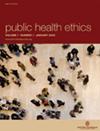在COVID-19大流行期间,日本医护人员受到羞辱和污名化
IF 2
3区 哲学
Q2 ETHICS
引用次数: 11
摘要
在2019冠状病毒(COVID-19)大流行期间,日本医护人员的污名化和sharming揭示了日本独有的特点。“面子”通常被翻译为“社会形象或他人眼中的形象”,是一股深植在日本人生活结构中的暗流。这导致感染了SARS-CoV-2病毒的医护人员感到羞耻,同时向同事和公共卫生官员隐瞒自己的病情。这也导致医疗服务提供者被认为受到污染,他们的孩子被告知他们在学校不受欢迎。虽然这样的经历并不局限于日本,在世界其他地方也出现过,但在日本,推动这种经历的文化力量是独一无二的。要克服对日本医疗保健提供者的污名化和羞辱,就需要共同努力,理解文化障碍,并将这种做法视为提出了影响所有人安全和福祉的人权问题。本文章由计算机程序翻译,如有差异,请以英文原文为准。
Shaming and Stigmatizing Healthcare Workers in Japan During the COVID-19 Pandemic
Abstract Stigmatization and sharming of healthcare workers in Japan during the coronavirus 2019 (COVID-19) pandemic reveal uniquely Japanese features. Seken, usually translated as ‘social appearance or appearance in the eyes of others,’ is a deep undercurrent woven into the fabric of Japanese life. It has led to providers who become ill with the SARS-CoV-2 virus feeling ashamed, while concealing their conditions from coworkers and public health officials. It also has led to healthcare providers being perceived as polluted and their children being told they were not welcome in schools. Although such experiences are not isolated to Japan and have appeared in other parts of the world, the cultural forces driving them in Japan are unique. Overcoming stigmatization and shaming of Japanese healthcare providers will require concerted efforts to understand cultural barriers and to view such practices as raising human rights issues affecting the safety and well-being of all.
求助全文
通过发布文献求助,成功后即可免费获取论文全文。
去求助
来源期刊

Public Health Ethics
PUBLIC, ENVIRONMENTAL & OCCUPATIONAL HEALTH-MEDICAL ETHICS
CiteScore
3.10
自引率
9.50%
发文量
28
审稿时长
>12 weeks
期刊介绍:
Public Health Ethics invites submission of papers on any topic that is relevant for ethical reflection about public health practice and theory. Our aim is to publish readable papers of high scientific quality which will stimulate debate and discussion about ethical issues relating to all aspects of public health. Our main criteria for grading manuscripts include originality and potential impact, quality of philosophical analysis, and relevance to debates in public health ethics and practice. Manuscripts are accepted for publication on the understanding that they have been submitted solely to Public Health Ethics and that they have not been previously published either in whole or in part. Authors may not submit papers that are under consideration for publication elsewhere, and, if an author decides to offer a submitted paper to another journal, the paper must be withdrawn from Public Health Ethics before the new submission is made.
The editorial office will make every effort to deal with submissions to the journal as quickly as possible. All papers will be acknowledged on receipt by email and will receive preliminary editorial review within 2 weeks. Papers of high interest will be sent out for external review. Authors will normally be notified of acceptance, rejection, or need for revision within 8 weeks of submission. Contributors will be provided with electronic access to their proof via email; corrections should be returned within 48 hours.
 求助内容:
求助内容: 应助结果提醒方式:
应助结果提醒方式:


